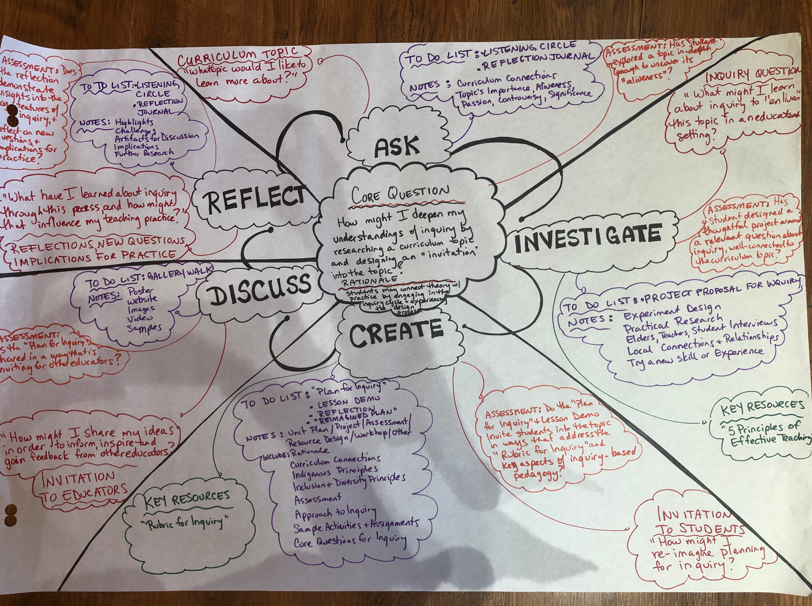I am Deepanjali Sachdeva, an Indian national. I come from the capital city of India, New Delhi. I have been teaching for over two decades, headed an elementary school for the last fifteen years besides teaching English in the same school for grades 3 to 5. I am a wanderer at heart and have traveled extensively, whole of my life. I believe that we are all shaped by the experiences of our life. My family, my profession and my passion to read, travel and learn have been the undercurrent of the personality I possess today. Having worked with elementary school has always given me immense joy. So to work for this “Inquiry” on one of the topics I feel close to my heart, best suited for children of any age, more so at elementary school is “Storytelling”.

https://images.app.goo.gl/MnKFEvAGWPVWYFaeA
We are surrounded by stories every day. They have existed as long as there have been people. The news on different platforms, the religious books, the songs, the pictures, the paintings, the movies, all are full of stories. The bedtime stories narrated to young children and the lessons teachers give in classes make up our history and guide our future. Some stories have lasted for centuries and are still being told in our families. We can trace back all our knowledge of the world to what we have learned to the different stories. They are powerful and are a part of all cultures, possessing the capacity to entertain us, learn history, make us laugh and cry and make us think, fantasize, are a large part of what makes people connected to each other. They enable us to visit faraway places in space and time in imagination, unlocking the endless possibilities for all who seek to learn.
Families are teachers of culture and the transmitters of tradition. As we go forward into an uncharted future, and whether we know it or not, we carry our past with us in many ways—in the homes and families of our origin, in the names we are given, in the heirlooms we inherit. Yet in times of rapid cultural change and ferment, ties to families are stretched thin; old traditions are abandoned for new religious and cultural forms or, sometimes, for nothing at all. These phenomena raise special challenges for all of us as we face choices regarding how much to retain of our familial, religious, and cultural roots—roots that, for many, have been twisted by the experience of living in a rapidly changing world. Nevertheless, how we treat our inheritances speaks volumes about who we are and how we stand in the world.
A child’s inquisitive mind constantly seeks explanations and flourishes with the ability to ask questions. When something doesn’t make sense, asking questions allows you to fill in the blanks and understand better in the context of answers. As an educator, honing and encouraging the skill to ask question serves well for students to quench their thirst for knowledge. Challenging the students from a very young age helps them ask the tougher questions later in life. Reading and questioning with the mix of critical thinking promotes logical thinking accompanied by the ability to use deductive reasoning and think abstractly. This project incorporates the inquiry cycle as students share their personal stories an anecdotes, and learn about the cultures of the world by asking questions and get to exhibit their personal journey of learning from each other in various ways. Students are building on knowledge that leads to deeper understanding. ! A big part of the inquiry process is to present their ideas to their peers or others. Through this “Storytelling Inquiry Project” students shall develop habits of mind that encourage them to ask questions of evidence, and determine viewpoints, patterns and connections and become an important participant in the construction of meaning.
This being a living inquiry, the best place to start it is wherever one finds oneself existentially. One looks inwardly into one’s own thoughts and feelings, while facing the world, noting how one reacts with conditioned thoughts and feeling responses. Usually we are too busy reacting that we do not stop to reflect and examine our response. Inquiry starts at this point of stop. From this place of stop, we question the necessity of “the way things are,” and address the possibility of seeing the world and the self differently and hence relating to the world differently. “What if I were to…?”
—Heesoon Bai, 2005, p. 47

6 replies on “Welcome”
Star: It is very hard for me to pick just one thing here because this project is wonderful in so many ways. I love how student-centered this is. You let the students create so much of what is occurring in class and regularly invite them to bring their own backgrounds and context into the classroom, giving them the opportunity to craft stories that are meaningful to them and help express their perspectives to their classmates. This unit helps connect students to their own identities as well as those of their classmates through the power of story. As an English Language Arts teacher, I love this approach and find it very inspiring
Wish: This is a nitpick, and I had to examine your work deeply to find anything I would even consider changing about it. When you are instructing students to consult with parents and grandparents, and considering a “Grandparents Day” as part of an extension, are you considering students who may not have grandparents in their lives? Maybe you could consider approaches that are more inclusive of all family dynamics, such as rebranding this as “Stories from Our Past Day” or something of the like.
Question: In the brainstorming section on your site, you made some great connections to other disciplines. How can you make these interdisciplinary connections present in your lessons?
Overall, this is very impressive and thorough Deepanjali. It is always a pleasure to see your work and being part of your lesson demonstration was a great experience.
Hello Tyson
Thanks for such wholesome feedback. Much appreciated.
To answer your first question I would say I have tried to incorporate the questions that I have posed as a part of interdisciplinary queries in my brainstorming section as supporting questions but have restricted the area of this inquiry to English language arts and Social Studies due to paucity of time. However, I plan to use this Unit Plan in the future as well, at that time I shall be covering the other disciplines as well.
Also, I appreciate the suggestion of reconsidering “Grandparents Day”. You have rightly mentioned there could be students who do not have grandparents in their lives. In that case, we can have a day dedicated to past stories instead. For which, we can have an ‘Open Day” and invite two people from each student’s family. These could be any aunt/ uncle/ distant relative/ family friend/ or parents. We can keep the format of the day as designed originally though: questioning, interviewing and recording (on paper or tape-record), the stories that have been a part of our past, and use them for the recreation of our stories for the final presentation.
Thanks
Deepanjali
Hi Deepanjali,
Star: I love how you are taking students in nature in some of the lessons. My project focuses on outdoor/nature based education because students nowadays do not have an emotional connection to the outdoors. I also like how you are making the project inclusive by incorporating many cultures, including Indigenous culture and your own.
Wish: I think starting with your own culture in the first lesson instead of Indigenous culture may be more personal for you and the students. You could incorporate Indigenous culture later on the lessons. Also, I would suggest to make the outdoor part of your lessons more meaningful. Rather than just going outside for a walk to get inspiration, you could further students’ learning outdoors by having them create stories using materials from nature or finding stories/legends based on the outdoors. You could also go on a sound/colour walk for students to get more inspiration for their own stories. Also, there are cultures that highly value the outdoors so you and/or the students could find their stories and share them with each other or research if the outdoors are significant in storytelling for some cultures and the reasons why.
Question: How can you make some of the activities inclusive to all types of families? I noticed in one lesson students are asked to ask elders in their family about their culture. Some students may not have an elder in their life so how can this part be more inclusive?
Gurreet Dhillon
Hello Gurreet
I am glad you could find connections between mine and your project. We can always exchange ideas for future references.
As for your suggestion, I wish to explain that I have used a story from the First Nations’ Culture because I feel that is my ode to the land, and also I am taking up this inquiry project in Canada based on the BC curriculum guidelines. However, I have taken a story from my own culture in the next class itself.
Also, I have mentioned in my reply to the previous comment and appreciate the suggestion of reconsidering “Grandparents Day” and have an “Open Day” instead that is dedicated to past stories from our family.
Thanks
Deepanjali
Hi Deepanjali,
I like the teaching content “storytelling across culture”in your project. I think learning different cultures by storytelling, is a relaxing, pleasant, interactive and immersive way, to help students extend their horizons and learn to respect diversity. Here, you also adopt storytelling as your inquiry pedagogy, which is very suitable and practical for students to grasp the significance of storytelling across culture. You have cross discipline teaching in your project, social studies and English language art. I’m wondering how you can effectively make connections between these two disciplines in one lesson. It will be an interesting work!
Hello Melody
Thanks for the feedback. I am glad you liked it. If you go through teh lessons you shall find that throughout the lessons i have connected the learning from the past(History). The cultural knowledge that has been passed from generations in a community/ family from different parts of the world covers both the disciplines of History and Geography(Social Studies).
English Language Arts covers the following:
The art of writing and rewriting the story in the form of a Play or a Skit.
Writing Journals and reflections
Learning to write with correct spellings/ grammar/ and presenting the lesson at the end of the Unit in the medium of your choice .
You may refer to the Lesson Plans for all the activities covered.
Thanks
Deepanjali.